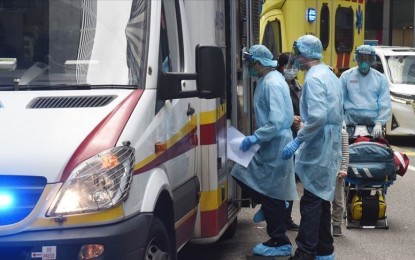News
China extends Lunar New Year holiday as new virus toll rises

FILE: CURBING CORONAVIRUS. Chinese health workers take measure to contain the spread of the 2019 novel coronavirus. China’s National Health Commission said it has recorded 830 confirmed cases nationwide since the outbreak of the virus was first reported to the World Health Organization (WHO) by Chinese officials on Dec. 31, 2019 in China’s central city of Wuhan. (Anadolu photo via PNA)
BEIJING — China extended its Lunar New Year holiday three more days to discourage people from travelling as it tries to contain the spread of a viral illness that has caused 80 deaths, the government said Monday.
There were 2,744 confirmed cases by midnight Sunday, the National Health Commission announced.
Tens of millions of Chinese who visited their hometowns or tourist spots were due to return home this week in the world’s largest movement of humanity, raising the risk the virus might spread in crowded trains and planes.
The official end of the holiday will be postponed to Sunday from Friday to “effectively reduce mass gatherings” and “block the spread of the epidemic,” a Cabinet statement said.
Schools will postpone reopening after the holiday until further notice, the statement said.
Some 769 new cases were confirmed Sunday and more than 30,000 people who had contact with possible cases were under medical observation, the Health Commission reported.
The government also reported five cases in Hong Kong and two in Macao. Scattered have been found in Thailand, Taiwan, Japan, South Korea, the U.S., Vietnam, Singapore, Malaysia, Nepal, France, Canada and Australia. The U.S. has confirmed cases in Washington state, Chicago, Southern California and Arizona.
President Xi Jinping has called the outbreak a grave situation and said the government was stepping up efforts to restrict travel and public gatherings while rushing medical staff and supplies to the city at the centre of the crisis, Wuhan, which remains on lockdown with no flights, trains or buses in or out.
While warning the virus’s ability to spread seemed be getting stronger, China’s Health Minister Ma Xiaowei said travel restrictions and other strict measures should bring results “at the lowest cost and fastest speed.”
The U.S. Consulate in Wuhan plans evacuate its personnel and some other Americans aboard a charter flight. France and Japan were weighing similar decisions.
The epidemic has revived memories of the SARS outbreak that originated in China and killed nearly 800 as it spread around the world in 2002 and 2003. Its spread has come amid China’s busiest travel period of the year, when millions crisscross the country or head abroad for the Lunar New Year holiday.
A notice from the U.S. Embassy in Beijing said there would be limited capacity to transport U.S. citizens on a Tuesday flight from Wuhan that will proceed directly to San Francisco. It said that in the event there are not enough seats, priority will be given to to individuals “at greater risk from coronavirus.”
The French Consulate also was considering an evacuation of its nationals from the city. It said it’s working on arranging a bus service to help French citizens leave Wuhan.
French automaker PSA Group said it will evacuate its employees from Wuhan, quarantine them and then bring them to France.
Japan was also making preparations to fly its nationals out of Wuhan.
Chinese travel agencies have been told to halt all group tours, and concern is growing over the potential impact of millions of people travelling back to the cities after the Lunar New Year holiday ends on Thursday.
China’s National Health Commission said anyone travelling from Wuhan is now required to register with community health stations and quarantine themselves at home for 14 days — the virus’ maximum incubation period.
In the heart of the outbreak where 11 million residents are already on lockdown, Wuhan banned most vehicle use, including private cars, in downtown areas.
China cut off trains, planes and other links to the city Jan. 22, and has steadily expanded the lockdown to 16 surrounding cities with a combined population of more than 50 million.
Wuhan is building two makeshift hospitals with about 1,000 beds each to handle patients. The city has said the first is expected to be completed Feb. 3.
Medical workers in Wuhan have been among those infected and local media reported a doctor died on Saturday morning. The 62-year-old physician was hospitalized on Jan. 18 and died a week later.
Xinhua also said medical supplies are being rushed to the city, including 14,000 protective suits, 110,000 pairs of gloves and masks and goggles.
The National Health Commission said it is bringing in medical teams to help handle the outbreak and the Chinese military dispatched 450 medical staff, some with experience in past outbreaks, including SARS and Ebola, Xinhua reported.
The new virus is part of the coronavirus family that includes the common cold but also more severe illnesses like SARS and Middle East Respiratory Syndrome. The new virus causes cold- and flu-like symptoms, including cough and fever, and in more severe cases, shortness of breath and pneumonia.
The illness first surfaced last month and the virus is thought to have spread to people from wild animals sold at a food market in Wuhan.
Chinese authorities announced a temporary ban on the trade of wild animals Sunday and called on the public to refrain from eating wild animal meat.

